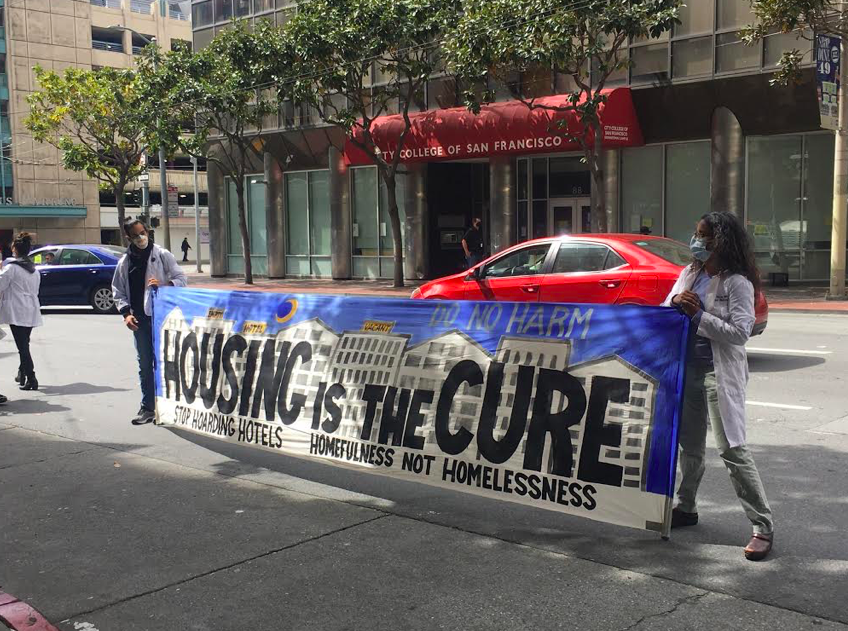The state Supreme Court handed San Francisco – and advocates for homeless people – a huge victory today by refusing to overturn Prop. C, the ballot measure that will bring in as much a $300 million a year from the biggest, richest corporations.
The ruling is also a huge win for local government and the ability to raise revenue by taxing the rich; it overturns one of the most odious elements of the 1978 ballot measure that devastated school and community funding.

The court, without comment, let stand a lower-court ruling that Prop. C was valid even though it received only 61 percent of the vote. Under Prop. 13, the 1978 anti-tax law, any ballot measure seeking funds for a specific purpose (like helping homeless people) needed a two-thirds vote.
The issue before the courts was this: Under Prop. 13, a tax measure proposed by a city council or county board needed two-thirds voter approval – and almost impossible threshold. (Although if Mayor London Breed had endorsed and worked for Prop. C, it might have made the cut.)
But the 1978 measure is silent on the question of whether the voters, through the power of direct initiative, can place a measure on the ballot that needs only a simple majority.
The Appeals Court decision held that the ultimate power is in the hands of the voters, and a direct initiative was exempt from the strictures of Prop. 13.
Now the Supreme Court has agreed, making Prop. C the law of the land and freeing up millions of dollars in tax money that the city has already collected to create permanent housing and services for homeless people.
“This is a people’s victory for the dignity and well-being of the most disenfranchised San Franciscans who are living on the streets, in shelters and in vehicles, said Miguel Carrera, formally homeless campaign organizer. It is a measure that seeks equity by taxing the very richest to house and engender opportunity for the very poorest.
Jeffrey Sinsheimer, legal counsel for the Prop. C campaign, put the ruling in context:
- The Court of Appeal explicitly found, and the Supreme Court implicitly affirmed, that neither Proposition 13 nor Proposition 218 restricted local voters’ constitutionally-protected power to adopt special tax initiatives by majority vote.
- Today’s decision will free up hundreds of millions of dollars that the voters intended to address the public health and poverty crises of homeless people within San Francisco when they placed Proposition C on the ballot and approved it with over 61% of the vote.
- The Supreme Court’s swift and just decision in this matter will help thousands of homeless people. San Francisco’s homeless population has been made even more vulnerable due to the COVID-19 crisis. Today, they are experiencing the worst effects of the smoke and poor air quality from the recent fires. We hope that the city will be equally as swift in implementing the programs these funds were allocated for.
“It was lonely there for a while, but we’re confident that when voters act through the initiative process, a simple majority is required,” City Attorney Dennis Herrera said in a press release. “We were the first public law office to take that position, and we were proud to do so, because we had the facts, the law and the will of the people on our side. From the beginning, this case has been about upholding the will of the voters. San Francisco voters have the right to direct democracy and self-government. We’re pleased that this legal victory will free up millions of dollars to provide services, housing and mental health treatment for those who most desperately need it in our city.”
The immediate implications are critical. The city has been collecting that tax money, but was unable to spend it; now, the Controller’s Office will be able to release a large sum of cash for homeless services, and the city will be able to count on it in future budgets.
The long-term implications are also important. This is a major crack in the armor of the right-wing anti-tax movement at a time when a ballot measure that would force big commercial property owners to pay their fair share of taxes is on the fall ballot.
I’m not a lawyer, and the legal experts are guarded, but it’s possible that this decision could also mean cities can raise money through bond acts without that anti-democratic two-thirds threshold. If a bond act qualifies through a citizen initiative, it might be able to pass with a simple majority.
The bottom line: Prop. 13 is starting to crumble. It can’t happen too soon.






